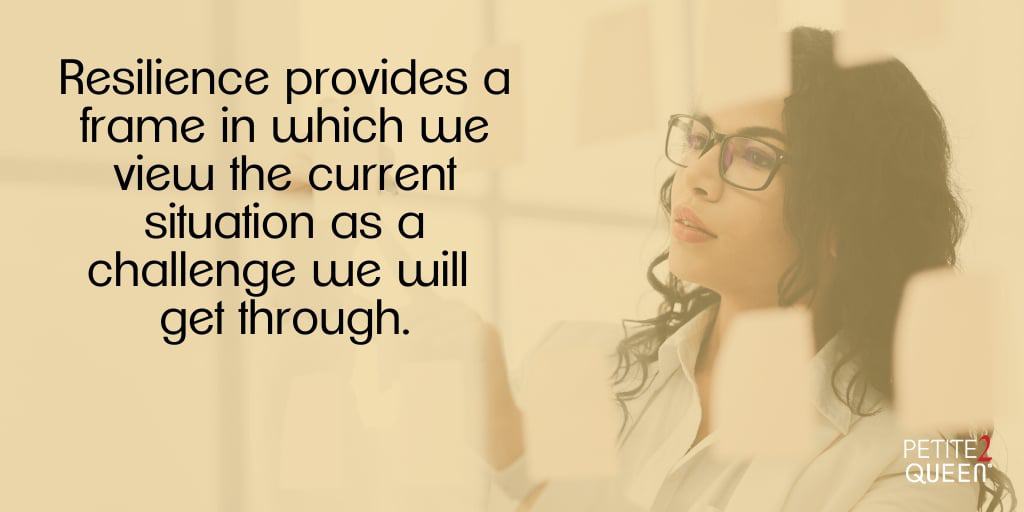Every day we wonder, what’s coming next? What’s on the other side of the tremendous disruption from the Coronavirus pandemic? How will we navigate the new normal? What practical skills will help us do so?
Working moms are unsung heroes. We support our families, friends, and co-workers while grappling with unknowns. We can never lose sight that we have the power to choose our path forward.
We have a responsibility to lead by our actions and the choices we make. We can use this historic time as an opportunity to teach life-long lessons to our children by the example we set. Our role is crucial as we set the tone to overcome an avalanche of challenges.
There are three practical skills we can tap into right now to function on a higher level, create a map, and unlock opportunities. I call it the motherhood RAP of resilience, agility, and problem solving. This will provide the means to revitalize our outlook and feed our desire to flourish.
Resilience
While it may seem obvious that resilience is required to navigate our altered environment at work and home, it is far more nuanced. The strength and practical skills we teach are poignant. Learning how to nurture and support resilience is an enormous gift to our children.
Resilience provides a frame in which we view the current situation as a challenge we will get through. It gives working moms the ability to balance fear with rational and productive outcomes, helping our children as they emotionally cope with anxiety.

When my husband was diagnosed with terminal cancer, my resilience was tested as never before. While it was a tragedy to endure, it was also an opportunity to make precious memories. Throughout his illness we did just that. My daughter emerged from this difficult journey empowered with the knowledge that every destination is a doorway to another.
The easiest way to strengthen your resilience is to practice self-care. If you don’t take care of yourself, you are no good to anyone. Spend time every day on an activity that replenishes your reserves. Watch a favorite show while petting your cat, enjoy a cup of your favorite tea while reading a few chapters of a good book, or perform yoga stretches while listening to soft jazz. Whatever nourishes your soul and recharges your batteries.
Along with incorporating self-care into your daily routine, when you are feeling stress – yet before you reach your breaking point – communicate your struggles with your family. With children, it’s especially important to frame your feelings in a way they can understand. By opening yourself up, you are teaching your children the lesson of asking for help when they need it. You are also giving yourself the gift of receiving their creative input to find a solution. Everyone is able to lean in and strengthen their ability to build resilience. Essentially, you are demonstrating to your children how to identify and process their feelings, then visualize the tools and means to navigate a difficult situation.
At work, an excellent way to learn resilience is to perform a review on a failed initiative or a situation that went poorly. Examine what could have been done differently and where improvements can be applied in the future. And most important, seek the reasons the failure was a success. What insights did you gain? What benefits you did you realize? What was the good that emerged from the experience?
We are all coping with disruptive change, from working remotely, to encountering novel distractions, and now to facing an imminent shift with more unknowns. This can feel overwhelming. A great idea to bring forth a path for motivation renewal is to hold an after-work virtual cocktail hour with your co-workers. Kick off your high heels and bring your favorite beverage as you each share challenges, triumphs, and creative solutions. Together you will gain fresh perspective, discover tips that have worked, and collectively nourish your resilience.
During my husband’s illness, we found a path forward by thinking not about what we were losing, but instead, about what we were getting. That’s the power of resilience. When we talk about the light at the end of the tunnel, it’s resilience that lets us see the glow. It’s also in lock step with agility. By digging into our resilience, we can leverage our power skill of agility.

Agility
Within the framework of the motherhood RAP of practical skills, agility is the capacity to pivot and change direction. This includes being responsive to altered circumstances according to the needs of our family, workplace, and community. More than anything, we can use it to teach our children that they can make a new choice. They are not tied to a decision when new facts are presented or different details revealed.
Agility is unique because of its truly empowering character. It enables us to bridge gaps, find common ground, and blaze a fresh trail. I recall when a product was not performing as needed at work. We pushed to ask why and examine the dilemma from multiple aspects to grasp the full picture. We then took corrective action with the insight gained.
In our home life, we find ourselves in a similar scenario. Finding unexpected activities for the whole family when homebound can relieve pent up frustrations of the same old day after day. Try creating a stickie note game. It can even be tied with something your child is in the process of learning, such as state capitals or new vocabulary words. Post questions on the walls and flat surfaces, and have a timed race to place the correct answer stickie notes under each question. You can expand this to the whole family working to make the “game pieces” on the stickie notes. It’s a simple way to exercise agility and come together.
To help our children, and ourselves, we need to consider novel ways to accomplish tasks. Agility helps us think creatively to respond to ever-changing requirements. More than that, it helps us seek the opportunities that arise from difficulties. Consider your child learning to ride a bike. When they fall over, they don’t think of the “failure,” they focus on what they learned. They try something different. Soon they are riding the bike like a pro.
It may be ideal to view this time as an opportunity to become more engaged with your child, but in reality, you are juggling more responsibility. Younger children especially can have a harder time with online learning. Try to combat this by creating your own recess breaks. During this shared time, play the music loud and have a dance party. Get your bodies moving and blood flowing. By expending pent-up energy, your children will be ready to return to their studies, and you will have invigorated yourself to focus on your work.
As you can see from this example, agility is closely linked with the practical skills of resilience and problem solving. Agility is the muscle we exercise to try again in a new way. When we embrace that change is a part of life, we consciously help our children learn how to be agile. Agility enables us to be curious, engage in positive learning, and solve problems.

Problem Solving
Whether as a parent or co-worker, problem solving sets you apart by demonstrating your commitment, composure, and ingenuity. When an obstacle or challenge emerges, the common responses are fight, flight, or freeze. Problem solvers respond with finesse. They focus on the ways and means to move through, over, or around the difficulty.
Our children (and our co-workers) are attuned to our emotional psyche. They are calmed and reassured when we maintain our poise and assurance when things go sideways. This equanimity is vital for everyone around us. It manifests as confidence to use knowledge, share ideas, and seek opportunities to solve problems. Our practical skills come into play here.
Looking back on learning agility, we can leverage creative tools to master problem solving. If you have a partner in the house, and both of you are working remotely, you may have found that, as the working mother, you are picking up most of the additional chores that have evolved. Resentment will begin to simmer, planting bitter seeds, if you do not quickly address this issue. In a riff on Let’s Make a Deal, create chore cards with time commitments. Then bring the whole family together, deal the cards, and starting making deals. Have fun elevating this necessary division of labor so everyone feels they have options and the power to choose.
In addition, at home we are juggling altered and overlapping demands upon our time. This is especially true if you are a single mom. An innovative way to visualize and resolve the inherent conflicts is to turn an old, large-piece puzzle upside down. Look in your closet for one of the puzzles your kids played with when they were two or three. On the wrong side of the puzzle, use a sharpie to break up and list your daily time periods at the top edge of the puzzle pieces. With your children, list all of your daily activities. Have them help you choose which puzzle pieces fit a specific activity. Together, you solve the puzzle when all the activities are listed and in place on the board.

At work, try the engaging exercise of formulating mind maps of various activities with your peers. Flex those problem-solving muscles by outlining dependencies, identifying interconnectivity, and asking “why.” This process of thinking helps you and your team visualize and explore various ideas. Mind maps are an excellent tool to break down barriers and see the other sides of a prism.
Another exercise to perform with your team members is the mitigation method. It enables the group to examine the worst thing, the best thing, and what is most likely to happen in pursuit of a given initiative. What do you anticipate? Where are there bottlenecks, potential missteps, or system failures? How will you work around them? By going through the scenarios, you are stretching your problem-solving muscles. Together, you are retraining your brains to look at all the moving parts and the possibilities.
By definition, encountering a problem is disrupting. And the disruption of COVID-19 may be spiking your stress levels. This could cause you to spend energy finding fault or worrying about possible follow-up issues instead of solutions. Captain Jack Sparrow had a great line your children can lean into: “The problem isn’t the problem. The problem is your attitude about the problem!”
Together, the three motherhood RAP of practical skills of resilience, agility, and problem solving create a powerful foundation for navigating through the Coronavirus pandemic. They serve us on a daily basis to maneuver through the onslaught of uncertainty, and they provide a unique opportunity to frame our children’s future be teaching them life-long skills. It’s our responsibility to show the way and choose the next destination.

Lynn Whitbeck is the co-founder and President of Petite2Queen. She is focused on identifying and evaluating opportunities for women at work, helping them define their personal roadmap. She dedicates herself to delivering tools and insights, embracing visualization of the big picture, and identifying and implementing the minutiae of detail. Lynn aims to share lessons learned along her journey and enable positive uplift for women.

